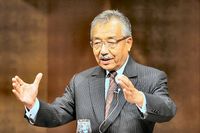


Toshio Matsuda, Commentator & Intl Economist
Straight from the Shoulder
Official Website : http://www.chokugen.com/e/
E-mail : masuda@sunraworld.com
FAX: 011 81 3 5965-0064
BackNumber is HERE!
After North Koreafs launch of seven missiles, one could hear the voice of Kim Jong-Il , the leader of the country saying gI wish our country could be a member of the international communityh. The most desperate hope, indeed!
From North Koreafs perceptive, it has seen the U.S. military attack Iraq and fears that no country and no international organization such as UN could stop the U.S. if it decided to attack North Korea. Moreover, North Korea knows that it has been called gthe axis of evilh by Bush together with Iraq and Iran.
Compare Bushfs policy on India with his policy on Iran. Bush has demanded a total ban on Iranfs nuclear development, yet Bush decided to help India develop its nuclear technology. Indiafs nuclear efforts have been for both peaceful and military purposes. What is it that made Bush distinguish his policy between Iran and India? The answer is that Bush has never viewed India as a part of the gaxis of evilh because India is not a dictatorship like Iran (which is also a great threat to Israel), but rather a democratic country. It is the control of government by dictators among the membership of the gaxis of evilh that the U.S. finds most objectionable. Why? Because dictatorship is antithetical to the policy of freedom that the U.S. has been advocating throughout the world. And the free world is also where the U.S. dollar prevails.
In response to the U.S. demand to North Korea that it dismantle its nuclear program, North Korea has insisted that it will only end its nuclear program and destroy all nuclear warhead related facilities and even allow international inspections upon the U.S. agreeing to guaranteeing the security of the current regime of North Korea. That maybe true, but then what are these missile launches for? A perverse act of international attention? Stamping its feet?
After their seven launches and strong warnings to Japan of further gphysicalh threats, the international media focused on North Korea day and night. The UN Security Council started a debate on North Korea. North Korea, North Korea, every hour, everywhere!
Once North Korea grabbed the worldfs attention by its missile launches, it asserted that the U.S.-Japan military exercises (that had been scheduled long ago and have been held for many years in the Japan Sea and Hawaii) were actually aimed at North Korea; indeed, they said, they were training exercises to invade North Korea (True!). Therefore, North Korea claims that there is nothing wrong with their missile launches in light of the U.S. and Japanfs aggressive military exercises against them.
Another facet of North Koreafs strategy (if it can be called that) is to continue escalating tensions by further aggressive acts that will result in further sanctions by Japan and the U.S.. The financial sanctions of the U.S. are having effect; North Korea is struggling for survival. However, continued North Korean threats will lead to even greater sanctions. The challenge in continuing and escalating sanctions on North Korea is the disruptive potential of their success; i.e. the collapse of the North Korean economy. An economic collapse in North Korea could result in military chaos with hundreds of thousands, even millions, of North Korean refugees fleeing to South Korea, Japan, China and neighboring countries. This is North Koreafs last, but fatal card that is even stronger than its nuclear card!
For the U.S. to guarantee the security of North Korea would be to directly support dictatorship; something it simply will not do. On the other hand, North Korea is reluctant to solve these issues through six-party talks because each of the six-parties has different and conflicting interests in North Korea. Yet, the U.S. is dedicated to the six-party approach. In fact, the U.S.fs dedication to the six-party talks (vs. bilateral talks) was even a point of departure between John Kerry and George Bush in their Presidential campaign debate on foreign policy two years ago.
So, why is the U.S. reluctant to have face to face talks with North Korea, if there is some reasonable expectation that the problems on North Korea would be solved?
I know the answer is not simple, but I believe it depends on when factors and circumstances align to facilitate the penetration of the U.S. dollar in China. Not now, but maybe after the collapse of Chinafs dictatorial communist regime. Perhaps after the Shanghai World Trade Fair in 2010. Many international economists believe that Chinafs economy will confront a very ghard landingh (as the U.S. Federal Reserve Board Governors would say) after the Worldfs Fair.
In order preserve North Koreafs survival till the coming economic crisis in China, Bush should not agree to Japanfs desire for yet additional sanctions against North Korea. Instead the U.S. should encourage China to continue its economic support of North Korea despite the sanctions being imposed by the rest of the world. It is absolutely important to keep Northeast Asia well in order until that big Chinese collapse in future.
There is no need for the a military response against North Korea. North Korea has no oil fields (as is the case with the other gaxis of evilh members in the Middle East). North Korea is really a kind of terrible portion of China; and it is really not that big. North Korea is just trying to make itself a big matter. Too much reaction to these perverse North Korean actions is to miss an opportunity, but it seems too late.
Anyone wanting to redistribute Straight from the Shoulder pieces or excerpts from the texts should direct their request in advance to the Toshio Matsuda Office at Sunraworld, Ltd. (Tel: 81-(0)3-3955-2121).
BackNumber is Here!